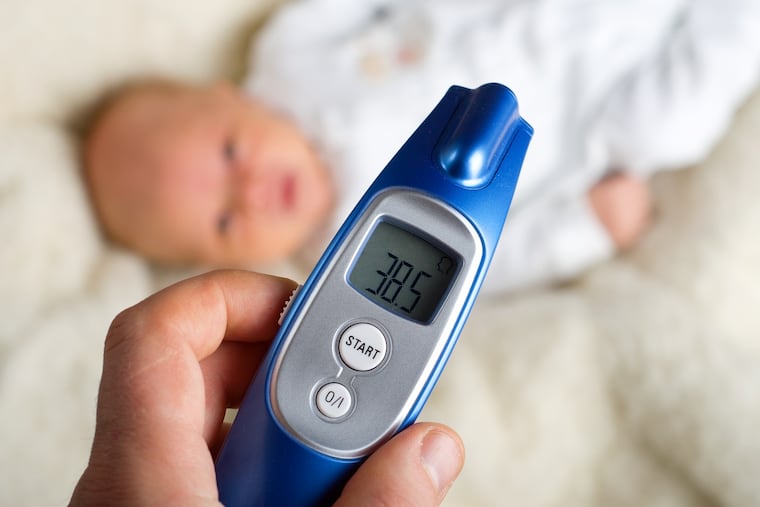Medical mystery: A baby with recurring fevers and a persistent mom
The pediatrician was prepared to advise fluids and Tylenol for the feverish baby. Then his mother insisted that the doctor take another look.

It was another busy emergency room shift in the middle of winter. Children with asthma, influenza, upper-respiratory infections predominated, some with high fevers.
After a thorough physical exam, I was able to reassure most parents that their child’s fever was the body’s normal response to help fight off a relatively benign virus that also was causing coughing and runny noses. I must have had a couple dozen of these conversations in a single shift.
As I was about to enter the room of an 8-month-old boy, I was prepared for more of the same.
As I entered the infant’s room, he clutched his mother tightly. He was an appropriate weight and his physical exam, except for a small ulcer in his mouth with some gum swelling, was normal. His fever was 102.2 but he was drinking normally and urinating normally, as well.
My initial reaction was to have the “continue-to-keep-him-hydrated-and-give-Tylenol-for-fever-if-irritable” talk. But first, I asked a question that I have learned can help get to the root of why a family has brought a relatively healthy-looking child into the ER.
“What worries you the most?”
Her answer: “He keeps getting fevers and each time I go to a different doctor or emergency room, they keep telling me the same thing: ‘It’s probably a virus.’ I want to know why.”
“How often does he get these fevers?” I asked.
“Almost every month since he was a few months old,” she answered. “Can you do blood work to see if his immune system is OK?" (A question that told me she had been doing her homework.)
"We will,” I answered.
I expected to find a rare, but treatable condition known as periodic fever syndrome. These cause episodic fevers even though there’s no bacterial or viral infection. There are several types, such as familial Mediterranean fever and PFAPA (periodic fever, aphthous ulcer, pharyngitis, adenitis) syndrome, which were a possibility.
Then the results of his blood testing came back.
Solution
My 8-month-old patient’s neutrophil count was extremely low.
Neutrophils are a type of white blood cell that help fight off infections by surrounding and destroying bacteria that enter the body. Low neutrophil counts can occur with serious infections or with bone cancers.
He was admitted into the hospital in case he had a serious infection and started on antibiotics. All his cultures came back normal and after three days his neutrophil count became normal. With his history of recurrent fevers, we had him come in for repeat blood tests three times a week.
Then, 21 days after his last fever, his fever spiked again and his neutrophil count came back at 100 (normal is greater than 1,500). He was subsequently followed by our hematologist and diagnosed with cyclic neutropenia.
This is a rare blood disorder that presents with recurrent episodes of low neutrophil counts every 14 to 35 days with an average, like our patient, of 21 days. Symptoms may include fever, lethargy, and/or sores (ulcers) in the mouth. People with low levels of neutrophils (neutropenia) are highly susceptible to recurrent infections. Luckily, this young patient hadn’t had one yet.
Cyclic neutropenia can be inherited or it can occur spontaneously, as in our patient. Most people with this disorder grow out of it by age 30. But until then, they need treatment with granulocyte colony-stimulating factor (G-CSF), an injection that raises neutrophil counts. Patients must be followed closely by a hematologist and when they do get fevers, need to be evaluated for infections.
We gave his mother information about a support network for families affected by neutropenia (www.neutropenianet.org), and accolades for her maternal instinct.
Daniel R. Taylor, D.O., is an associate professor at Drexel University College of Medicine and director of community pediatrics and child advocacy at St. Christopher’s Hospital for Children. He is a member of the Inquirer’s Health Advisory Panel.